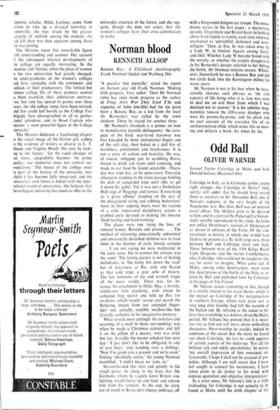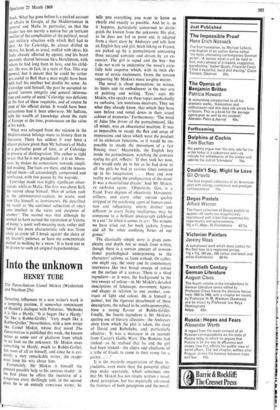Samuel Taylor Coleridge in Malta and Italy Donald Sultana (Blackwell
84s)
Odd Ball
OLIVER WARNER
Samuel Taylor Coleridge in Malta and Italy Donald Sultana (Blackwell 84s)
Coleridge in Italy, as in Germany earlier, seems right enough—but Coleridge in Malta? Odd, surely; still odder that he should have served there as secretary to Sir Alexander Ball, one of Nelson's captains, at the very height of the Napoleonic war. But then, Ball was an unusual naval officer. The Maltese grew to be devoted to him, and in a portrait by Pickersgill at Green- wich, suitably reproduced in this study, he looks not unlike Droeshout's version of Shakespeare as shown in editions of the Folio. Of the con- versations in history at which one would have liked to be present as a fly with large ears, those between Ball and Coleridge must rate high. Those between NCOS of the 15th Kings Royal Light Dragoons and the recruit Comberbacke, alias Coleridge, who could not be taught to ride, are far easier to imagine. What came out of Malta, among other benefactions, were some fine descriptions of the battle of the Nile, as re- lated by Ball and published later by Coleridge in the pages of The Friend.
Mr Sultana makes something of this, though it is strictly related to his main theme, which is the impact on Coleridge of his peregrinations in southern Europe, which took place not so very long after Goethe had felt the warmth of the Italian sun. By refusing at the outset to be- lieve that everything was known about the Malta period, Mr Sultana has proved that it is never too late to find out still more about enthralling characters. Hero-worship he avoids; indeed he confesses at the outset that the more he found out about Coleridge, the less he could approve of certain aspects of his make-up. 'For all his brilliant talk and subtle speculations,' he writes, 'my overall impression of him remained un- favourable. I hope I shall not be accused of pre- judice. Although I am well aware that I have not sought to conceal his weaknesses, I have taken pains to do justice to his mind with copious quotation and objective interpretation.
In a strict sense, Mr Sultana's title is a trifle misleading, for Coleridge is not actually to be found at Malta until the sixth chapter of his
book. What has gone before is a packed account of affairs in Europe, of the Mediterranean in general and Malta in particular, so that the reader has not merely a notion but an intricate outline of the complexities of the political, naval
and military situation with which Ball had to
deal. As for Coleridge, he almost drifted to Malta, his head, as usual, stuffed with ideas, his body already affected by opium, and his heart unevenly shared between Sara Hutchinson, with whom he had long been in love, and his child- ren. He was, in fact, in a state of flux. This was normal, but it meant that he could be rather less useful to Ball than a man might have been with half his intellect but double his sense. As Coleridge said himself, the post he occupied re- quired 'austere integrity and general informa- tion and sanity of mind.' Coleridge was deficient in the first of these requisites, and of course he tired of his official duties. It would have been miraculous had it been otherwise. Mr Sultana, with his wealth of knowledge about the state of Europe at the time, pronounces on the value of his work.
What was salvaged from the sojourn in the Mediterranean belongs more to history than to literature. There has seldom if ever been a clearer picture given than Mr Sultana's of Malta at a particular point of time, or of Coleridge in process of disintegration. The author is right to say that he is not prejudiced : it is so. More- over, he makes no concessions towards simpli- fied reading. The facts are there, and the reasons behind them—all astonishingly compressed and reinforced, with few pauses by the wayside.
Coleridge made two highly significant obser- vations while at Malta. The first was about Ball, the second about himself. Men of action such as the administrator-captain, he wrote, used men like himself as instruments. He described the result as 'the continual subjection of one's own intellect to the views and purposes of another.' The second was that although he seemed to have earned the reputation at Valetta of being 'a quiet well-meaning man, rather dull indeed' his more characteristic talk was 'from circle to circle till I break against the shore of my hearer's patience, or have my concentricals dashed to nothing by a snore.' It is hard not to be drawn to such an original hypochondriac.











































 Previous page
Previous page